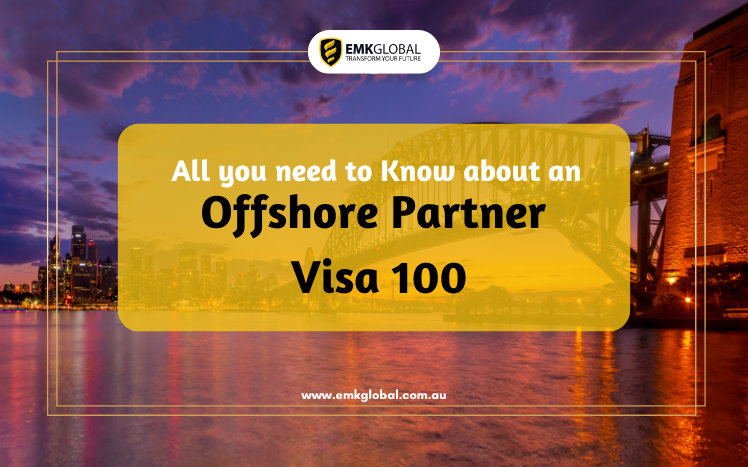An Australian partner visa is designed to reunite the spouse or de facto partner of eligible New Zealand citizens, Australian citizens, or permanent residents. Partner visas in Australia allow candidates to live and work in the country temporarily or permanently based on their chosen category. Partner visas in Australia are divided into two main categories:
- Offshore partner visa (subclass 309 and 100)
- Onshore partner visa (subclass 820 and 801)
In this blog post, I’ll provide you with an in-depth analysis of the partner visa 100, covering all its aspects, including the application process, eligibility criteria, processing time, and visa cost. Let’s first understand what a partner (Migrant) visa 100 is.
What is a Partner Migrant Visa (Subclass 100) in Australia?
A Partner (Migrant) visa (subclass 100) allows the de facto partner or spouse of an eligible New Zealand citizen, Australian citizen, or permanent resident to reside in Australia permanently. It is the final step towards permanent residence after obtaining a temporary partner visa (subclass 309) in Australia.
With a partner visa 100, you can:
- Reside, work, and study in Australia permanently.
- Access the Australian public healthcare system, Medicare.
- Sponsor your eligible family members to come to Australia.
- Travel to and from Australia for approximately five years.
- Apply for Australian citizenship later on, if eligible.
What are the Eligibility Requirements for a Partner Visa 100?
To be eligible for a partner visa subclass 100, you must meet the following requirements:
- You must already hold a 309 partner visa.
- You must have a continuous and genuine relationship with your spouse or de facto partner in Australia.
- You and your sponsor must have been together for a minimum of two years, or two years must have passed since you submitted your combined application for both 309 and 100 visas.
- You must have been living together and in a mutual relationship, excluding other partners.
- Both you and your spouse must be of good character and in good health.
- Any debts to the Australian Government must be paid before applying for the partner visa 100.
What is the Application Process for a Partner Visa 100 in Australia?
The Australian visa application process can be challenging and stressful. Therefore, it is important to understand the procedure to apply for a partner visa subclass 100. Below is a step-by-step guide for submitting your visa application:
Step 1: Things to Consider Before You Apply
- If the Department of Home Affairs has already granted you a partner visa 100 immediately after you received your temporary visa subclass 309, you do not need to provide additional documents.
- If not, you must submit further additional documents. Check your visa status via Visa Entitlement Verification Online (VEVO).
- Seek professional immigration assistance if needed. Ensure the person you appoint is a registered migration agent, legal practitioner, or an exempt person.
Step 2: Gather and Organize the Required Documents
You can submit your documentation for the permanent stage of your partner visa after two years have passed since the submission of your initial application for both temporary and permanent partner visa streams. It is important to gather and organize all the required documents before applying for partner visa 100 in Australia. Here is the checklist of required documents:
Required Statutory Declaration Forms:
- At least two statutory declaration forms completed by someone who knows about your relationship history.
Personal Documents:
- Marriage certificate (if applicable).
- Evidence of Subclass 309 visa grant.
- Relationship statements from you and your sponsor.
- Copy of recent passport showing your photo, personal details, issue, and expiry dates.
- Proof of joint correspondence addressed to both partners, including bills, deliveries, invoices, and receipts.
- Evidence of joint financial commitments, such as joint bank accounts, joint financial documents, bills, and other financial liabilities.
- Evidence of shared accommodation, including joint lease agreements, mortgage documents, joint property ownership documents, and utility bills.
Documents for Dependents:
- Recent passport copies.
- Birth certificates.
- Proof of custody arrangements.
- Proof of support if dependents are over 18 years old.
- Visa grant notification of Dependent Child visa (subclass 445), if applicable.
Personal Documents for Sponsors:
- Recent passport of the sponsor showing all personal details.
- Statutory declaration of sponsor verifying the genuineness and sincerity of the relationship.
Health and Character Certificates:
- Police clearance certificate for the main applicant.
- Police clearance for dependent children over 16 years old.
- Medical examination certificates showing that the applicant is not suffering from a contagious disease.
Remember to translate all these documents into English.
Step 3: Apply for the Visa (Transition from Subclass 309 to 100)
Two years after you apply for the combined temporary and permanent partner visa, you are eligible to submit your application for the permanent partner visa. Follow these steps:
- Log into your ImmiAccount.
- Scroll down and click “Stage 2 – Permanent Partner Visa Assessment (100, 801).”
- Attach the required documents to the application form and submit the application form.
- Keep track of your Transaction Reference Number (TRN).
Step 4: Wait for the Visa Outcome
Once you have submitted your visa application, you can manage or track it through the ImmiAccount website. You can be in or outside the country when the Department of Home Affairs makes a decision about your permanent partner visa.
If your application is approved:
- You will receive details like your visa grant number, start and expiration dates of your visa, and other visa conditions.
If your application is refused:
- You will be notified about the reasons for your visa refusal and whether you can review the decision.
What is the Processing Time for a Partner Visa (Subclass 100)?
According to the Department of Home Affairs, the general processing time for an Australian partner visa (subclass 100) is between 19 and 27 months. Here is a table that provides a comprehensive analysis of the processing time based on the percentage of applications being processed:
| Applications Percentage | Processing Time |
| 25% of applications | 12 Months |
| 50% of applications | 17 Months |
| 75% of applications | 20 Months |
| 90% of applications | 29 Months |
What is the Visa Cost of Partner Visa 100?
Usually, there is no need to pay for a subclass 100 partner visa as you have already paid for this visa while submitting a combined application for temporary and permanent visas (309 & 100). The visa cost for a combined application for both 309 and 100 partner visas is approximately AUD 8,085 for the main applicant.
However, in addition to the application fee, you may have to spend additional charges for getting police clearance certificates and birth and marriage certificates.
Closing Insights
A partner visa (subclass 100) provides the candidates with an opportunity to reunite with their family members and partners in Australia. By now, you have reviewed the application process, documents checklist, and eligibility requirements for applying for a subclass 100. So, what’s next? Take a practical step towards the application process if you truly want to unite with your family.


